Mid-Range to High-End Buyer's Guide, January 2006
by Jarred Walton on January 2, 2006 1:00 AM EST- Posted in
- Guides
Remaining Recommendations
The majority of the remaining parts all have a lesser impact on performance, and for several areas, you can just get whatever is cheapest. A low cost case might have sharp edges inside, and a low cost PSU might be noisy or fail prematurely - particularly if you load up the system with higher end components - but otherwise, there isn't a huge difference between the remaining components other than prices. Since we're giving Mid-Range and High-End configurations, we will be spending quite a bit more on the latter for what some may feel are unimportant aspects of a computer system. The Z-5500 speakers, for example, are overkill if you're living in an apartment or small house. For that matter, even the Z-2300 speakers are more than what many users will need. More than any of the other recommendations, there is a lot of subjective opinion in picking out these remaining items. If you don't want powerful speakers, save the money. If sound quality is important - which is our assumption on the High-End platform - you will probably want good speakers as well as a discrete sound card. If you're happy with a cheap case, you can cut costs there as well. Here are our guidelines for the remaining components.
The only two areas where it's really worth upgrading to something more than the above choices are storage and the power supply. If you're planning on running multiple GPUs with multiple hard drives, the 400W SmartPower 2.0 in the Mid-Range system may prove insufficient. The ePOWER/Tagan in the High-End system is more than enough for almost any use, though there are quite a few alternatives with a similar price. Fotron Source, Antec, Enermax, Seasonic, OCZ, and several other companies make PSUs worth considering, but we like the modular design, SLI support, and general high-quality of the Tagan unit. $120 is a lot to pay for a power supply, but then we'd even take it one step further and recommend picking up a UPS to go with the computer. $100 will get a good quality UPS that will help prevent loss of data from anything ranging from a power outage to an electrical surge.
The hard drives both ended up being from Western Digital, with the only upgrade on the High-End component being the move to a 16MB cache model. 250GB of storage and 3.0Gbps transfer rates are plenty for the vast majority of users. You could even drop down to a 160GB or even 80GB HDD if you don't need the storage, though the cost per GB on the 250GB drives is the lowest of any of the models. If you store lots of music, movies, photos, etc. on your system, though, you might want to go the other way and look for more storage capacity. Seagate's 300GB and larger 7200.9 drives can be found with 16MB of cache for the ultimate in capacity and performance, but prices are quite high. Some people still swear by the faster access times of the WD Raptor drives, but personally, I would add more RAM before worrying about spending $150 for a 74GB drive. If you want some data reliability, some motherboards are even shipping with integrated RAID 5 controllers: use 3 or 4 HDDs and you can get over a TB of storage and still be protected from data loss as long as no more than one drive fails. That's really more low-end server/high-end workstation stuff, however, so we'll stick with a single 250GB drive for now.
The majority of the remaining parts all have a lesser impact on performance, and for several areas, you can just get whatever is cheapest. A low cost case might have sharp edges inside, and a low cost PSU might be noisy or fail prematurely - particularly if you load up the system with higher end components - but otherwise, there isn't a huge difference between the remaining components other than prices. Since we're giving Mid-Range and High-End configurations, we will be spending quite a bit more on the latter for what some may feel are unimportant aspects of a computer system. The Z-5500 speakers, for example, are overkill if you're living in an apartment or small house. For that matter, even the Z-2300 speakers are more than what many users will need. More than any of the other recommendations, there is a lot of subjective opinion in picking out these remaining items. If you don't want powerful speakers, save the money. If sound quality is important - which is our assumption on the High-End platform - you will probably want good speakers as well as a discrete sound card. If you're happy with a cheap case, you can cut costs there as well. Here are our guidelines for the remaining components.
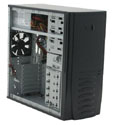 |
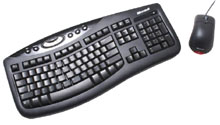 |
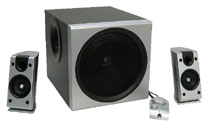 |
| Click images to enlarge. | ||
| Mid-Range Components | ||
| Hard Drive | Western Digital 3.0Gbps 250GB 7200RPM 8MB Caviar SE | 99 |
| Optical Drive | BenQ DVDR DQ60 (OEM) | 41 |
| Case and Power Supply | Antec Solution SLK3800B + 400W SmartPower 2.0 | 116 |
| Speakers | Logitech Z-2300 2.1 | 112 |
| Keyboard and Mouse | Microsoft Comfort Curve 2000 + Optical Mouse | 30 |
| Total | 398 | |
 |
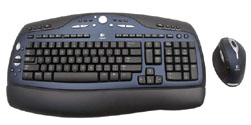 |
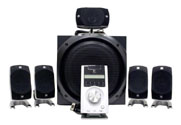 |
| Click images to enlarge. | ||
| High-End Components | ||
| Hard Drive | Western Digital 3.0Gbps 250GB 7200RPM 16MB Caviar SE16 | 115 |
| Optical Drive | NEC DVDR ND-3550A | 43 |
| Case | Lian Li PC-6077B Aluminum | 138 |
| Power Supply | ePOWER/Tagan TG-530-U15 530W | 120 |
| Sound Card | Creative Sound Blaster Audigy 2 ZS | 73 |
| Speakers | Logitech Z-5500 5.1 w/Dolby Digital | 253 |
| Keyboard and Mouse | Logitech Cordless Desktop MX3100 (Laser tracking mouse) | 95 |
| Total | 837 | |
The only two areas where it's really worth upgrading to something more than the above choices are storage and the power supply. If you're planning on running multiple GPUs with multiple hard drives, the 400W SmartPower 2.0 in the Mid-Range system may prove insufficient. The ePOWER/Tagan in the High-End system is more than enough for almost any use, though there are quite a few alternatives with a similar price. Fotron Source, Antec, Enermax, Seasonic, OCZ, and several other companies make PSUs worth considering, but we like the modular design, SLI support, and general high-quality of the Tagan unit. $120 is a lot to pay for a power supply, but then we'd even take it one step further and recommend picking up a UPS to go with the computer. $100 will get a good quality UPS that will help prevent loss of data from anything ranging from a power outage to an electrical surge.
The hard drives both ended up being from Western Digital, with the only upgrade on the High-End component being the move to a 16MB cache model. 250GB of storage and 3.0Gbps transfer rates are plenty for the vast majority of users. You could even drop down to a 160GB or even 80GB HDD if you don't need the storage, though the cost per GB on the 250GB drives is the lowest of any of the models. If you store lots of music, movies, photos, etc. on your system, though, you might want to go the other way and look for more storage capacity. Seagate's 300GB and larger 7200.9 drives can be found with 16MB of cache for the ultimate in capacity and performance, but prices are quite high. Some people still swear by the faster access times of the WD Raptor drives, but personally, I would add more RAM before worrying about spending $150 for a 74GB drive. If you want some data reliability, some motherboards are even shipping with integrated RAID 5 controllers: use 3 or 4 HDDs and you can get over a TB of storage and still be protected from data loss as long as no more than one drive fails. That's really more low-end server/high-end workstation stuff, however, so we'll stick with a single 250GB drive for now.










67 Comments
View All Comments
Reldan - Wednesday, January 18, 2006 - link
As awesome as a 30" Apple Cinema is, have you considered the prospects of using a much larger HDTV? I use a 65" HP MD6580n, and it's the best monitor I've ever owned bar none. It's ridiculously huge but the picture remains sharp at 1920 X 1080, especially with the wobulation tech which removes most if not all of the screen door effect you might have with a set this size.I know that a big deal is being made about these awesome 30" monitors from Apple and now Dell, but HDTV technology has progressed to the point where in my mind there is no better choice for high-end gaming.
gman003 - Monday, January 9, 2006 - link
So my question to everyone is, is 2GB really worth the $100 upgrade compared to 1GB. Can you get decent memory to overclock with at 2GB? If I was planning to run a DFI LanParty Ultra-D board, would I really use the same 2GB memory Jarrod recommended for the HighEnd system for my overclocking purposes?I guess the biggest thing that struck me from the article was that you could probably get away using an old ATA133 7200rpm Drive as long as you have 2GB of memory. Should I really sacrifice not upgrading my hard drive so that I can have 2GB of memory?
flamethrower - Monday, January 9, 2006 - link
You can check out the following article. The gist is that you get better loading times with more ram, the article will show you the results from changing various ram amounts in a high-end setup.http://www.tomshardware.com/2005/12/13/how_much_ra...">http://www.tomshardware.com/2005/12/13/how_much_ra...
I apologize for linking to an outside site, but I don't think the content is available on Anandtech. Maybe you guys should think about (or point me to) your article on this topic.
Finally, you wanted to know "Is it worth it?" Only you can answer this question. My personal opinion is that it is, but you might be building a budget system and not have the budget for 2GB RAM. As Jarred points out: "You are not going to notice 60 fps vs. 63, but you are going to notice a 38 sec loading time vs 63" or something like that.
gman003 - Monday, January 9, 2006 - link
Ok, maybe I will clarify:I am building a budget $800 system and want to know what will give me better performance.
Should I stay with 2 gigs of ram and not upgrade my old ATA 133 7200rpm 200GB drive or get 1 gig of ram and upgrade my hard drive to a new 3.0GB SATA 7200rpm 250GB.
Yeah, I've read that article too. But I mean, c'mon? With 2 gigs of ram, you don't notice any significant advantages in like 9 out of 10 tests with the only significant thing being load times/heavy multitasking. I don't know if I can justify $100 to load World of Warcraft 30 seconds sooner when I'm more concerned with FPS, video encoding, and large file transfers. IMO I think the the $100 could be spent on a HD or even better, a cooler mobo and/or case for the system.
JarredWalton - Tuesday, January 10, 2006 - link
Generally speaking, for games you want GPU speed first, and CPU speed second. RAM speed and quanitity as well as HDDs are distant fourth/fifth place finishes. Once you've got the others at a reasonable speed, though - where diminishing returns kicks in - then you should start looking at upgrading the RAM and then the HDD. That's my take, anyway.flamethrower - Sunday, January 8, 2006 - link
What do you guys think about an Opteron 165 or 170 instead of the X2 4200+? The 170 and the 4200+ are about the same price.JarredWalton - Monday, January 9, 2006 - link
If you're willing to overclock, there's no real reason to go any higher than the 165/170 Opty or the X2 3800+. I've got a 165 that OCs to around 2.5 GHz with the stock HSF. I'm going to try a few changes to the system to see if I can go further than 2.5 GHz, but there's really not that great of a need.pg55555 - Thursday, January 5, 2006 - link
If you are looking for performance, I think RAID 0 is a valid alternative that is often forgoten in the guidesJarredWalton - Saturday, January 7, 2006 - link
I've used RAID 0 and found it to largely be a waste of time and money. RAID 1 and 5 I can understand, but in terms of improving load times, running 2GB of RAM has done far more for me than running RAID 0. It's just a lot of hassle for negligible performance increases IMO.archcommus - Tuesday, January 3, 2006 - link
I was pretty definite that the Klipsch Ultra 5.1 has better sound quality and bass than the z-5500. Now that AT recommended the Logitech even for the high-end system, I'm not so sure.I really like my music and am in the market for a new 5.1 system. Should I go z-5500 or Klipsch ProMedia Ultra?